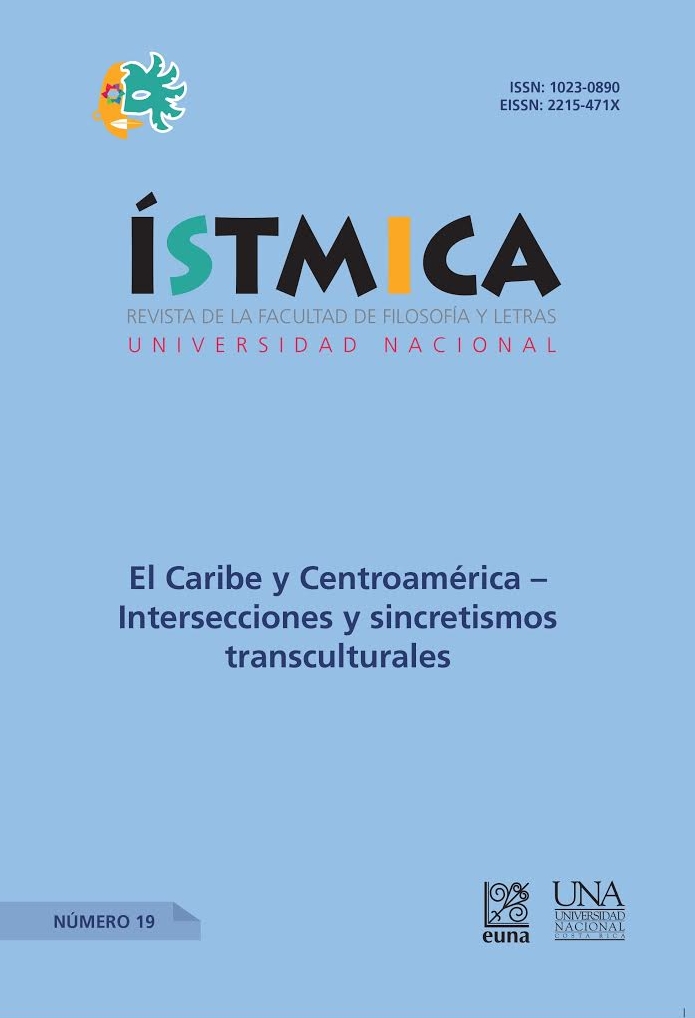En torno al campo literario afrohispanoamericano
DOI:
https://doi.org/10.15359/istmica.19.5Keywords:
afrohispanoamerican literature, literary criticism, ethnicity, African descent, ontologizationAbstract
Although the presence of black subjectivities is not new in Latin American
literature, the field had not acquired the force or topical recurrence
has achieved over the last fifteen years. This is articulated with the overwhelming
socio-political movement ‘African descent’ identity -category agreed in 2000-, which has created a rhetoric from anthropology, sociology, the legal field, etc., which has also permeated the literary discourse. I propose in this article that positive racialization and from below, ie, from the same subalternized sectors in recent years, has led a stimulating rhetoric of a “should be” African descent that is repeated throughout the work, not only fictional, but also a certain sector of criticism. This work attempts to roblematize the force with which the rhetoric of the productions of African descent identity has entered the Latin American literary criticism in recent years causing, in some cases, generalizing readings and racialized that naturalize the idea of pre-existence and transhistoricity of a “being African”.
References
Angenot, M. (2010), El discurso social. Los límites históricos de lo pensable y lo decible, Buenos Aires: Siglo XXI.
Arboleda Quiñones, S. (2010), El mestizaje radical de Manuel Zapata Olivella: raza, etnia y ciudadanía. En C. Mosquera-Lavé et al. (Eds.), Debates sobre ciudadanía y políticas raciales en las Américas negras (197-206), Cali, Universidad del Valle.
Briones, C. (1998), La alteridad del “Cuarto mundo”. Una deconstrucción antropológica de la diferencia, Buenos Aires, Ediciones Del Sol.
__________. (2007). Teorías performativas de la identidad y performatividad de las teorías. Tabula Rasa, (6), pp. 55-83.
Brubaker, R y Cooper F., (2001). Au-delà de l’ ‘identité’. Actes de la recherche en sciences sociales, Vol. 139, pp.66-85.
Campos García, A. (2015), Introducción. En S. Valero y A. Campos García (Eds.). Identidades políticas en tiempos de la frodescendencia: Auto-identificación, Ancestralidad, Visibilidad y Derechos (15-64). Buenos Aires, Corregidor.
__________.(2012): Racialización, racialismo y racismo. Un discernimiento necesario. Universidad de La Habana 273, pp. 184-198.
Hall, S. (2003.), ¿Quién necesita la identidad?. En S. Hall y P.de Gays (Eds.), Cuestiones de identidad (13-38), Buenos Aires: Amorrortu.
Obeso, C. (8 de septiembre de 1874). Palabras al aire. La Ilustración, p. 276.
Ruiz, E. B. (2009). La invisibilidad de Manzano. Afro Hispanic-Review. (28), pp. 167-183.
Segato, R. (2007) La nación y sus otros. Raza, etnicidad y diversidad religiosa en tiempos de Políticas de la Identidad, Buenos Aires, Prometeo.
Valero, S. (2007a). Invisibilidades directas y oblicuas. De cómo los discursos racistas ‘oscurecieron’ la producción ‘afrodescendiente’. Negritud: Journal for Afro Caribbean-Afro Latin American Studies, (1) pp. 163-183.
__________. (2007b). Antologías e historias literarias. El poder de definir identidades y (des)proveer de agencia literaria: el caso de los ‘afrodescendientes’ en Colombia. Estudios de Literatura Colombiana, (21), pp. 103-122.
__________. (2013) ¿De qué hablamos cuando hablamos de “literatura afrocolombiana”? o los riesgos de las categorizaciones. En torno al campo literario afrohispanoamericano literatura colombiana, (32) pp. 7-15. En línea, en: http://aprendeenlinea.
udea.edu.co/revistas/index.php/elc/article/view/16290/14123.
__________. (2015a). Literatura y ‘afrodescendencia’: identidades políticas en la literatura afrolatinoamericana del siglo XXI”. Revista de Crítica Literaria Latinoamericana (81), pp. 9-17.
__________. (2015b). Afroepistemología y sensibilización en las narrativas históricas ‘afrodescendientes’ del siglo XXI. En S. Valero y A. Campos García, (Eds.). Identidades políticas en tiempos de afrodescendencia: Auto-Identificación, Ancestralidad, Visibilidad y Derechos (531-578). Buenos Aires, Corregidor.
Zapata Olivella, M. (1977) La letra como instrumento de combate del negro. Letras Nacionales (35) p. 7
Downloads
Published
How to Cite
Issue
Section
License
Las personas autoras que publiquen en esta revista permiten cesión gratuita, exclusiva, de ámbito mundial de sus derechos de autoría a la Universidad Nacional (Costa Rica), conservando únicamente sus derechos morales sobre la obra publicada.
Los artículos pueden ser citados y copiados, citando a la persona autora y la fuente. Todos los artículos publicados en la Revista Ístmica están protegidos bajo una Licencia Creative Commons Atribución-NoComercial-CompartirIgual 4.0 Internacional








